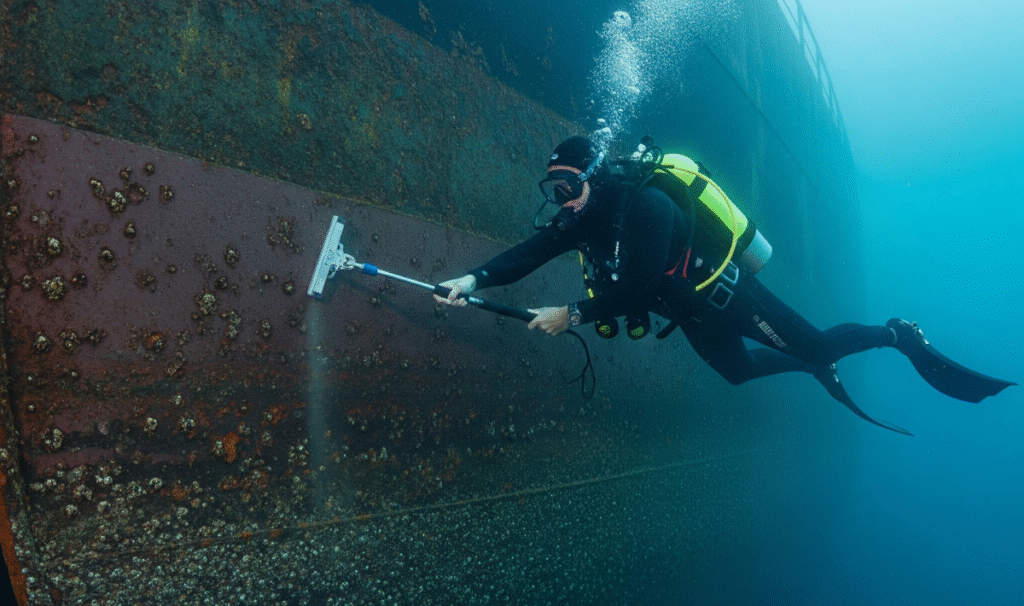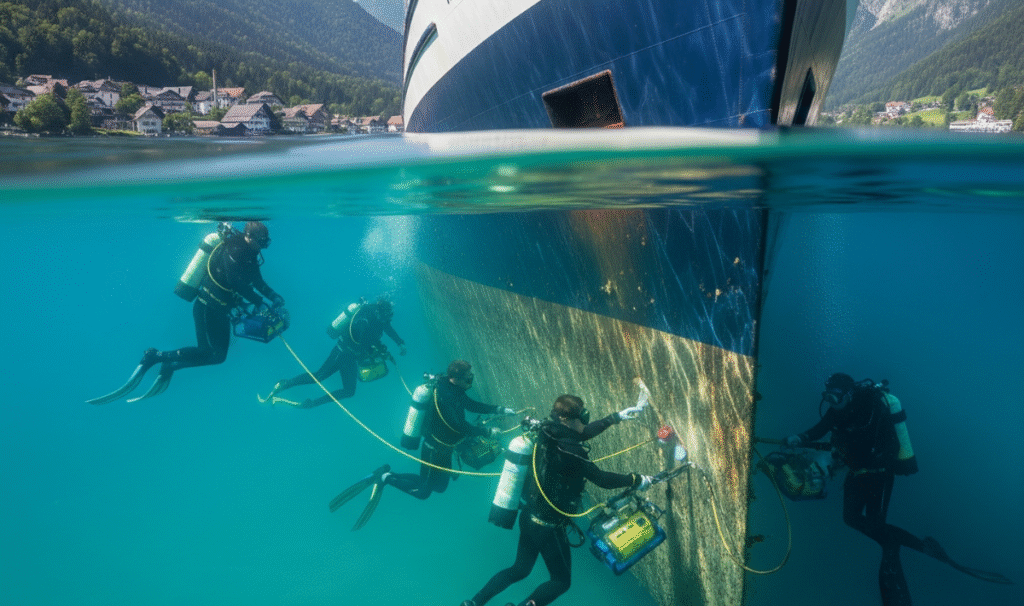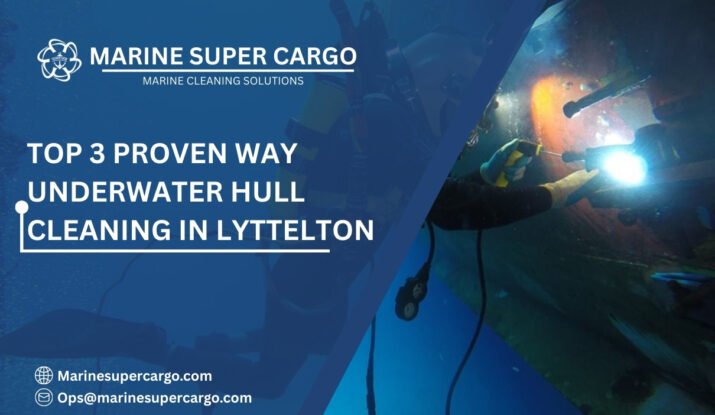If you own or manage a vessel operating out of Lyttelton Harbour, the topic of underwater hull cleaning in Lyttelton is more than a line on your maintenance checklist—it’s fundamental to efficiency, fuel savings, compliance, and the health of your vessel and local waters. Imagine your hull as a swimmer’s swimsuit: clean, it’s slick and smooth, but after a season of barnacles and algae? Suddenly, you’re dragging fabric weighted with silt and seaweed, burning energy just to move. In Lyttelton, with its bustling commercial port and active marine life, fouling is inevitable—but with the right approach, it never has to become a crisis.
Why Underwater Hull Cleaning in Lyttelton Is Critical for Vessels
Marine fouling on hulls isn’t just cosmetic. Even a thin layer of slime or early barnacle growth increases drag, forcing your engines or sails to work harder and your fuel costs to climb. For larger vessels and commercial operators, regular underwater hull cleaning in Lyttelton makes the difference between profitable and marginal operations. For yachts and pleasure boats, it preserves performance and enjoyment, and—crucially—protects the underwater coatings that are your first defense against corrosion and invasive species.
Lyttelton Harbour’s Marine Environment and Fouling Risks
Lyttelton sits on New Zealand’s east coast, with tidal flows, sediment-rich runoff, and cold yet nutrient-laden waters. This blend is paradise for barnacles, algae, and an ever-changing roster of marine creatures eager to make your hull their home. Due to the mix of commercial and recreational activity, ships and smaller boats alike experience rapid fouling—especially when moored for extended periods. That means underwater hull cleaning in Lyttelton must be planned, frequent, and thorough.

Risks of Neglecting Underwater Hull Cleaning in Lyttelton Waters
Let your underwater cleaning slip, and your vessel will soon remind you:
- Fuel costs climb: Even “light fouling” can drive fuel use up by 10–15%.
- Speed and maneuverability drop: The boat feels heavy, slow to turn, and sluggish to react.
- Coating degradation and corrosion: Fouling penetrates protective paints, exposing hull metal and fixtures to rust.
- Biosecurity and legal risks: Failing to manage hull fouling raises the risk of transferring invasive species—an offense in New Zealand and a fast way to earn fines or be denied entry at sensitive ports.
- Unscheduled downtime: Missed hull cleaning can mean emergency maintenance at the worst times.
The Process of Underwater Hull Cleaning in Lyttelton
Professional underwater hull cleaning in Lyttelton weaves together diver safety, advanced technology, local compliance, and environmental best practices.
Dive Preparation and Safety Protocols
The process begins with thorough site assessments—tides, visibility, vessel condition, and traffic proximity. Divers run full safety and comms checks, supported by surface teams, which are crucial in Lyttelton’s busy commercial harbor.
Advanced Tools in Action:
- Rotary brushes and scrapers remove fouling without damaging coatings.
- Water jets and suction systems tackle tough spots safely.
- ROVs conduct pre/post inspections, reducing diver risk and enhancing reporting.
- Spoils vacuums and containment systems prevent pollution, aligning with strict NZ regulations.
- Filtration units ensure only clean water is returned—critical for Lyttelton’s biosecurity as a key cargo hub.
How to Select a Trusted Hull Cleaning Service in Lyttelton
With so many providers, it’s vital to choose those who prioritize compliance, crew safety, and environmental care.
Certifications, Experience, and Local Compliance
Look for divers with valid commercial and safety certifications, experience handling Lyttelton’s biofouling conditions, and proof of insurance. Ensure they comply with MPI and port rules, use eco-friendly cleaning methods, and provide proper documentation. Local references and MARPOL awareness are key to trusted, compliant service.
Best Cleaning Frequency for Lyttelton’s Conditions
Due to the area’s blend of temperate and productive waters, most vessels in Lyttelton benefit from hull cleaning every 2–4 months. Commercial vessels or those stationary for long periods may require more frequent cleans, while active vessels with effective antifouling can stretch the interval. The key? Stick to a regular schedule and don’t wait until fouling is visible to act.
Environmental Regulations and Best Practices
New Zealand enforces some of the world’s strictest marine biosecurity rules, and Lyttelton is no exception:
- All cleaning debris must be fully contained—never discharged into the water.
- Sensitive areas like ecological zones often restrict or ban underwater cleaning.
- Marine pest sightings must be reported immediately, halting all work.
- Antifoul paints and chemicals must meet environmental standards to avoid toxic runoff.
These measures align with IMO guidelines and protect both vessels and marine ecosystems. Compliance isn’t optional—it’s essential.
Costs in Underwater Hull Cleaning in Lyttelton: What to Expect
Pricing depends on size, fouling level, and service complexity, but in Lyttelton, expect:
- NZD 7–13 per foot for recreational vessels
- Larger ships: Competitive with global ports given Lyttelton’s scale
- Extra charges for ROV inspection, emergency work, or additional services (anode changes, propeller polishing)
Regular cleaning saves money in the long run through fuel savings and prevention of expensive hull repairs—an investment every prudent owner or operator should make.
DIY vs. Professional Underwater Hull Cleaning in Lyttelton
While topside scrubbing can be handled DIY, underwater hull cleaning in Lyttelton is best left to certified professionals:
- Safety risks: Diving in a busy port with strong currents and low visibility is hazardous without proper training.
- Compliance: Only pros can ensure proper debris containment and full regulatory adherence—key in ports aligned with IAPH standards.
- Insurance: Many insurers and port authorities require proof of professional servicing.
- Effectiveness: Professionals use advanced tools and techniques, spotting issues early and delivering thorough results.
Smart maintenance starts below the waterline—choose expertise for safety and compliance.

Real Benefits: Efficiency, Savings, Longevity, and Compliance
- Up to 15% reduction in fuel use after a single cleaning
- Longer hull coating life: Gentle, regular cleaning avoids costly recoating or hull repairs
- Early detection of underwater risks: Cracks, corrosion, or invasive species
- Peace of mind: Stay legal, avoid port delays or sudden maintenance crises
Conclusion: Secure Your Smoothest Voyage from Underwater Hull Cleaning in Lyttelton
In Lyttelton’s thriving, challenging harbour, underwater hull cleaning in Lyttelton is not just another maintenance job—it’s a critical investment in your vessel’s performance, longevity, and compliance. Work with certified local experts, follow a proactive cleaning schedule, and always choose environmental stewardship. Your hull, your crew, and our coastal waters will be all the better for it. Whether you’re running a cargo vessel or a family yacht, a spotless hull is your ticket to efficiency, speed, safety, and pride on every journey from Lyttelton.
FAQ:
Q1. How often should I schedule underwater hull cleaning in Lyttelton?
For most vessels, every 2–4 months works best, but heavy users or commercial ships may require more frequent attention depending on fouling rates.
Q2. Are there specific environmental laws for hull cleaning in Lyttelton?
Q3. What does professional underwater hull cleaning cost in Lyttelton?
Typical costs run NZD 7–13 per foot, with extra charges for specialized services or larger commercial vessels.
Q4. Can I clean my hull underwater myself in Lyttelton Harbour?
DIY is not recommended—the risks, regulatory requirements, and need for containment mean certified professionals are the smart choice.
Q5. Why is hull cleaning so important for fuel efficiency and compliance?
Fouling increases drag and fuel use dramatically, while proper cleaning ensures you meet Lyttelton’s legal and biosecurity standards, saving money and trouble on every trip.


